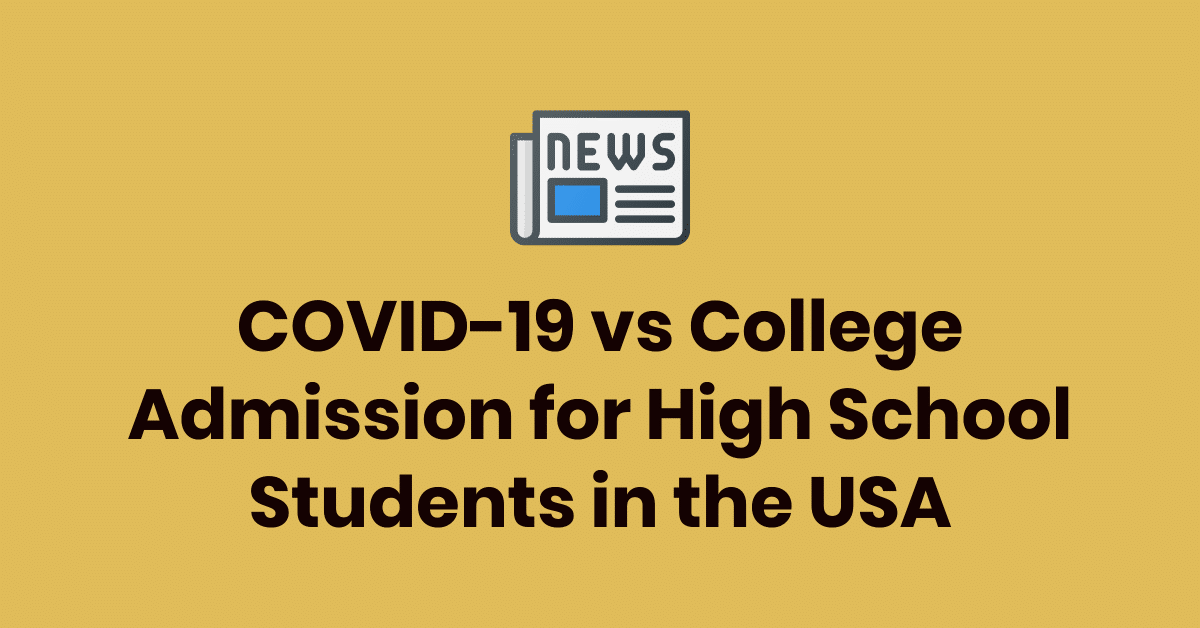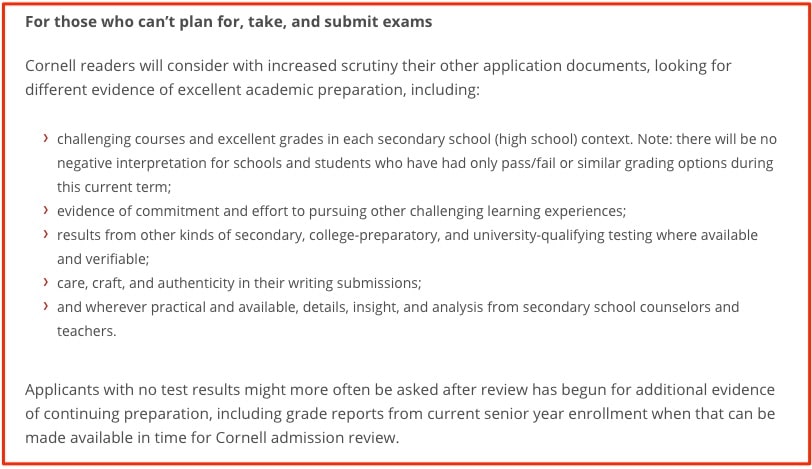Impact of COVID-19 on College Admissions for High School Students (+ Strategies)
So, what’s happening in the College Admissions landscape due to COVID-19? I’m talking about the impact of Coranavirus for High School students in the USA.
I would say- A lot! Now, parents and students are left in limbo to deal with test-optional policies. Some languages are vague, like “You don’t have to submit test scores, if you send the scores, it will be considered for admissions.”
Topics Covered in this article:
- Typical Questions from Parents and Strategy
- Test-Optional Schools & Test Prep Recommendation
- The Big Story – Waitlisted & Admitted
- Strategy for High School Students
I’m working with High Schoolers and their parents to help them navigate the College Admission and Planning.
Here are some of the biggest questions I’m answering:
- Student: I have 1400 in SAT and not sure which colleges to apply, or should I retake the SAT?
- Parent: We did not study in the USA, and now this COVID-19 is complicating the college admission process, how to get Admission with Financial Aid?
- Parent: What extra-curricular activities should we do in this Summer with a stay at home orders?
Questions about College Major Selection
- Student wants to go to Med-School
- Study Biomedical Engineering or Biology or Double Major in Human Biology with a Finance degree and then apply to Medical School?
- Apply to Direct BS/MD programs?
- Student wants to study Biomedical Engineering
- Apply for Biomedical Engineering or
- Mechanical Engineering and do a Masters in Biomedical Engineering (when part of Biomedical Engineering involves Mechanical Engineering).
- Students want to study Data Science
- Study a Bachelors in Computer Science with Minor in Data Science or
- Study BS in Data Science or
- Study BS in Information Systems with Minor in Data Science
Answers to these questions are not straight forward.
So, how do you handle these questions with Test-Optional and changing admission policies?
Test-Optional Schools
At the time of this writing, over 1240 Colleges and Universities have gone Test-Optional in the USA as per FairTest.org
Princeton University is the only Ivy League College still requiring SAT and ACT for College Admissions for the class of 2025.
Harvard, Columbia, Brown, Cornell, Dartmouth, University of Pennsylvania have made SAT and ACT optional for the class for 2025 (Students applying in 2020 – 2021).
- Test-Optional: Applicants can still submit the test scores (if they have taken the test) and it will be considered
- Test-Blind: Schools will not even look at the test scores for Admission (like CalTech).
Columbin University posted the following revised testing policy.
“If students have completed testing and can submit SAT or ACT results, we encourage them to do so as we believe this information can be a valuable addition in our review process. However, testing is no longer a required component for the first-year 2020-2021 application cycle, and students who are unable or choose not to submit test scores will not be disadvantaged. We will continue to evaluate all submitted information within the holistic and contextual review process that considers individual circumstances shaping each applicant’s journey. The rigor of a student’s curriculum, their academic achievement, and their demonstrated intellectual curiosity will remain central to our review.”
They are encouraging students to submit the test scores on the one hand and while mentioning that students who choose not to submit or unable to submit will not be at a disadvantage. Why don’t schools go Test-Blind instead of posting this confusing language?
Cornell University: Goes Test-Optional for Class of 2025
Cornell overall has not planned to adopt a test-optional admission policy permanently. As appears to be true at test-optional colleges and universities, we anticipate that many students who will have had reasonable and uninterrupted opportunities to take the ACT and/or SAT during 2020 administrations will continue to submit results, and those results will continue to demonstrate preparation for college-level work.
So, you might wonder how Cornell will evaluate students if SAT or ACT scores are not submitted?
Cornel’s Press Statement included the following:
What Should Students Do with Test Prep?
I’m working with families and students who have taken SAT or ACT in 2019 (while in the 11th Grade), and they are ready with the test scores, while there is also a student who has taken SAT or ACT and wanted to improve the scores.
Now, colleges on one side are telling; we are going test-optional while encouraging to submit the test scores.
Students are wondering to appear for the SAT or ACT. If so, should they give 100% effort to boost the test score or focus on extra-curricular activities in the Summer?
Here’s my recommendation about Test Prep:
- If the colleges you are applying are Test-Blind, then don’t take the test.
- If the colleges you are applying are Test-Optional, then take the test and give your best effort.
When it comes to SAT or ACT Test prep, here’s what I would recommend:
- Rising Seniors (11th to 12th Grade) – Work with a Tutor one on one (you got just one shot to get the highest score)
- Rising Juniors (10th to 11th Grafe) – Self-Prep for SAT or ACT. Take the Test once. Then Hire a Tutor to improve your test score (second attempt).
Test-Optional Schools for Class for 2025
Here’s a list of school waiving SAT or ACT Test for Class of 2025 (applying for college from Oct 2020)
- Ivy League:
- Cornell University
- Harvard University
- Brown University
- Dartmouth College
- Columbia University
- University of Pennsylvania
- Princeton University – No Changes to SAT or ACT Policy (as of June 17, 2020)
- Williams College
- Amherst College
- University of California Universities
- Tufts
- Northeastern
- Boston University
- Vassar College
- Pomona College
- Davidson College
- Haverford College
- Rhodes College
- University of Washington
- The University of Oregon
- Oregon State University
- Scripps College
- Texas Christian University
- Trinity University in San Antonio (three-year period)
- Tulane University
- Case Western Reserve University
- Barnard College
- Baylor University
- California State System
- Claremont McKenna College
- Indiana University, Bloomington (Permanent starting in 2020-21)
- Indiana University, South Bend (Permanent starting in 2020-21)
- Santa Clara University
- University of Richmond
Over 1240 Colleges in the U.S. have gone test-optional, and this list will grow daily! There is over 2500 4-year degree offering colleges and universities in the USA.
May 1 – College Decision Day
May 1 is the College Decision Day. And, some schools have moved the Decision to June 1.
The BIG Story: Colleges are digging deeper into their waiting lists to offer admissions. Students who would not make it from the waiting lists are now getting admits!
But why?
- International Students
- Attending In-State School
- Gap-Year
International Students are deferring the admits to Fall 2021. But why?
- They either don’t want to come to the USA (or)
- The U.S. Consulates are closed, and they can’t get the F1 Student Visa.
Here’s an example from one of my student:
International students make up about 10% to 15% of the Freshman class.
According to the Princeton Review Survey, 70% of domestic students choose to attend colleges within 180 Mile Radius from home.
And students are hesitant to attend colleges in N.Y. or L.A.
Plus, a student who decided to attend Private Colleges will pay a higher tuition fee ($50k to $75k per year). But, they could end-up attending classes online. So, many are deferring the Admission and taking a Gap Year. Which means colleges have unfilled seats for Class of 2024 (starting in Aug 2020).
Here’s the announcement from Princeton University about the student’s deferral request.
Students who consider deferring their matriculation at Princeton for fall 2020 should write to the Office of Admission for approval. Please know that, as always, the University plans to approve gap years for specific, established reasons, such as military service, religious study, pre-professional arts programs, and unforeseen health challenges that arise prior to matriculation.
This is an extraordinary and uncertain time, given COVID-19. For those students who defer their matriculation at Princeton for fall 2020 for other reasons, we will let admission offers stand, consistent with our policies. But depending on the number of deferrals, we cannot guarantee matriculation in a student’s preferred year because of enrollment and housing constraints. To be clear, students may not be permitted to matriculate in their preferred year, and they may have to wait one or more years than they would have hoped.
If you wish to be considered for a deferral, please contact the Office of Admission at [email protected] by no later than July 15, 2020, and provide a paragraph or two about your plans for the year and why you believe the deferral will serve you well.
Students who were waitlisted received admits right after sending the letter of continued interest. But, things will be a bit tough for the Class of 2025.
College Admission for Class of 2025
So, how does this deferral and COVID-19 impact the students applying for the Class of 2025 (Fall 2020) admission cycle?
If 5% of students were granted deferred Admission to next year, that’s 5% less admitted students for the next year (class of 2025).
If 15% of international students are unable to get the U.S. Student F1 Visa, they will also be requesting deferrals. That’s 20% of students not coming to attend college this Fall 2020!
That’s approximately 360 students less available seats for next year freshman applicants for the class of 1800 freshman!
In other terms, the Admission is expected to be more competitive for Highly Selective Colleges unless Universities decide to increase the admits recovering the lost revenue for the next 1 to 3 years.
Plus, I expect the merit-based scholarships and award amount to get a hit as well.
Harvard University announced that its financial aid program would not be impacted.
As was the case during the economic downturn a decade ago and in similar situations before, our revolutionary financial aid program will not be compromised in any way. The majority of Harvard students receive need-based financial aid – and loans are not required. Our office stands ready to help, and students can use our net price calculator to get an estimate of the aid their family would receive.
Universities like Harvard can say that their financial aid program will not be impacted when they have an endowment of 41 Billion Dollars!
According to NYTimes: Over the past decades, the endowments of America’s richest universities have exploded in value. At the end of the last fiscal year, Harvard’s endowment was $41 billion, Princeton’s was $26 billion and Michigan’s was not far behind, at $12.4 billion.
I think for the next few years, it may be easy to get Admission into selective colleges than getting into top public universities in-state. Families who were on hoping to pay for Private colleges will be focussing on saving money and staying in-state due to financial restrictions or hoping to save money due to economic uncertainties.
The best approach to stay competitive is by using Early Decision (E.D.) and Early Action Effectively based on your family’s affordability.
Strategy:
- Recent High School Graduates – Missed out on your dream school, if you are waitlisted, write a letter of continued interest (you never know)
- Rising 12th Grade – Use Early Decision Effectively or E.A. (& REA)
- 10th, 9th Grade – Plan for In-home Summer/Year Long Scholarly Activities
- 8th Grade – Course Planning is the key (always) for Course Rigor.
8th to 10th – There shouldn’t be any impact on Admission since you are a few years from applying to colleges. But, students will miss-out this Summer being home. Summer months should be used to take part in activities to show-case interests towards a specific field
- like EMT training for Med School when shadowing doctors are not possible
- High School Summer Camp Research or Scholarshrly activities (Online program)
- Starting a Non-Profit with your friends
- Starting a company
Additional Reading:
- Early Action Admission Deadline, Timeline, and List of E.A. Colleges
- Early Decision College: Complete List by State (& Growing)
This Summer, a student can’t take part in such activities. Plus, the school’s out till Aug 2020. So, take part in meaningful activities counts.
- Online Summer Camp – Good
- Online College Courses – Better
- Online Courses for College Credits – Best
These options will vary based on the student’s interests. It could be an online Summer Immersion Program to Practicing your skill at home.
Next Steps:
I’m working with High Schoolers and their parents to navigate the College Admission and Planning.
Here two more common scenarios.
- We never studied in the USA and did not realize College Planning is a four-year-long process. My child is in High school, is there anything he/she can do to get into a top college?
- We (both parents) are in I.T., and our daughters want to study Arts Degree. We are not sure about any future career opportunities. Should we agree with her choice?
Answers to these questions are not straight forward.
When parents deal with a child’s college – emotional and finance are involved. A third person’s perspective and guidance can help solve the impasse.
If you are new to the college admission process or dealing with college admission for your child in the USA for the first time, watch the FREE hour-long, highly informative webinar.
- Attend this Free College Planning Webinar
- How to get into Highly Selective Colleges
- 9 Factors in used by Highly Selective College
- Financial Aid Formula (Simplified Version)
- You can watch the instant replay or pick the next available slot.








